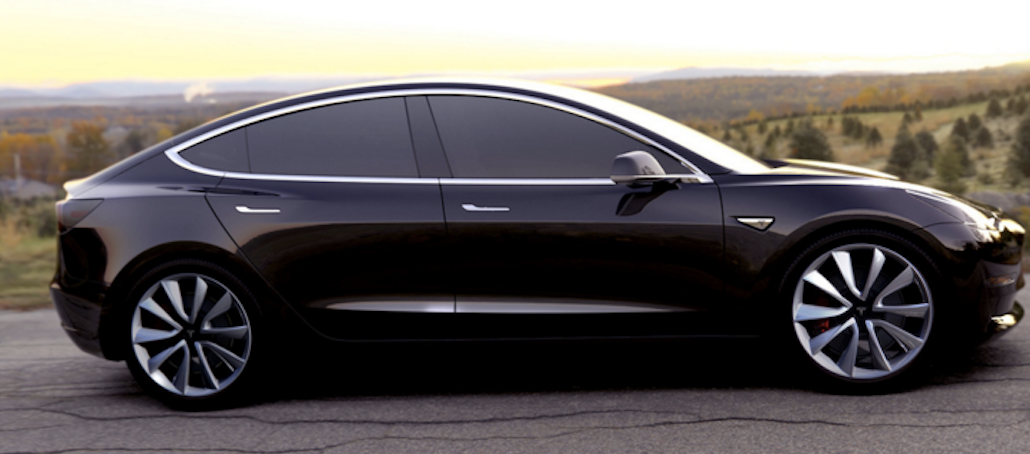Tesla is the new Red Bull: Every brand wants to be it but can’t pull it off

Ulli Appelbaum placed an online order for Tesla Model 3 at 7:30 p.m. Pacific Time on March 31, an hour earlier than the car was even unveiled on a live stream.
“What prompted me to buy the car unseen? Tesla’s and Elon Musk’s vision of a sexy world powered by electricity,” said Appelbaum, president of brand strategy firm First The Trousers Then The Shoes. “I watched every single YouTube video of Model S. So even though I had no idea what Model 3 would look like when I ordered it, I had trust in the technological and design capabilities of the car.”
Appelbaum is not alone. To date, more than 325,000 Model 3 cars have been sold (around $14 billion in pre-orders), which breaks the automotive industry’s sales records. But the Model 3 order frenzy wasn’t driven by any big-budget ad campaigns. Tesla told Digiday that it has a very small communications team and all of its marketing collaborations is handled in-house.
No CMO. No agency. No huge advertising budget. Like Red Bull, with its powerhouse media operation that shoots people into space, Tesla is exactly the brand everyone would build. All the same, Tesla is singular. Ninety-nine percent of brands do not have a visionary leader whose every tweet becomes a news story — and boasts an outlandish mission to remake modern human transportation, alter the earth’s energy infrastructure, and, while at it, heal the planet from the ravages of fossil fuels.
“A combination of factors leads to Tesla’s marketing success: Innovative, revolutionary products and a genius CEO Elon Musk who has track record of success. I’m not sure you can replicate what Tesla has been doing – or if there’s a marketing model for other brands,” said Rebecca Brooks, co-founder of market research firm Alter Agents.
Unique products and distribution channels
Tesla has a simple goal: Bring compelling and affordable electric vehicles to mass market. The company creates a desire for cars in an up-and-coming space, going after eco-friendly groups without sacrificing style or performance.
Unlike traditional automakers Ford and Chevrolet, Tesla has its own dealerships. Musk believes that these other franchise dealers have a fundamental conflict of interest when it comes to selling gasoline-powered cars: Traditional dealers make more money from selling services, tuneups and add-ons than they do from selling cars, while the company makes a profit from selling its electric cars, Todd Maron, Tesla’s general counsel, explained in his interview with Fortune. They simply cannot explain the merits of Tesla’s new electric technology without undermining their traditional business at the same time.
Tesla also adopts a pre-sales model – which was rarely used in the automotive industry before – as a way to gauge the demand, because it doesn’t have inventory.
“Tesla’s genius marketing strategy is in the promised ownership experience. The dealerships are very different and its staff are highly trained and knowledgeable. Upgrading of software that adds new features drives a feeling that the car isn’t just a depreciating lump. These are the touch points that immerse.” said Matthew Morgan, co-founder of dating app Cuplin who used to develop consumer experience programs for Ford, Bentley and Lamborghini.
A genuine CEO: Elon Musk
The ongoing Model 3 hype is reminiscent of Apple products. Tesla and Apple share similarities in the way that they present themselves. Both companies focus their ethos around one single character – Steve Jobs for Apple and Musk for Tesla. But unlike Jobs when he was still alive, Musk is very active on social, especially on Twitter. There, he keeps followers looped in on everything happening in his business, making sure that Tesla’s growth feels like a community effort that involves everyone. Beyond that, he also posts something irrelevant to Tesla and sometimes he responds to individuals.
My coffee tastes unusually good this morning pic.twitter.com/LowwuPAgoz
— Elon Musk (@elonmusk) February 18, 2016
Appelbaum, the Model 3 buyer, started following Musk on Twitter a year ago and reads every article Musk posted to the Tesla’s blog. “What I really like is that Musk feels genuine, like the guys next door and a bit geeky,” said Appelbaum. “He’s not the polished CEO. You can tell it’s his voice. And oh, I liked the fact that he refused to deliver a model S to a venture capitalist who had publicly bitched about Model S and then ordered one.”
Sam Williamson, SEO executive for Aims Media, thinks that Musk’s presence on Twitter that is perhaps the most interesting aspect of the marketing that he does for Tesla. “Two things are immediately apparent when you read his tweets: He’s passionate about what he does, and he loves his fans,” he said.
Earned media is amplified by social sharing
Revolutionary products and a genius CEO have brought Tesla lots of earned media. PR analytics software TrendKite found that within the first week of its March 31 launch, Tesla Model 3 had more media mentions (close to 34,000) than the entire electric car industry (a little more than 15,000). On social specifically, Tesla garnered around one million shares with 900,000 from Facebook, 125,000 from Twitter and 75,000 from LinkedIn.

Car shopping is becoming a social experience. Since not everyone is familiar with Tesla’s features, the company’s social media approach of providing users with relevant, detailed information about models that they’re interested in will likely drive sales growth overall, according to Nancy Lim, director of marketing for auto ad tech platform PureCars.
Megan Hartman, strategy director for Red Peak Branding, added that Tesla’s social activity has helped bring fans together and given them a venue for self-expression. Her agency’s research of 6,000 18-34 year olds shows that Tesla ranks highly for “ingenuity,” specifically “isn’t afraid to challenge the status quo” and “is driven by innovation.”
“Passion for the brand will only increase from social, because the more accessible Tesla becomes, the more brand ambassadors they create essentially,” said Hartman.
While there’s a lot of buzz around Model 3 and Tesla as a brand, the company is not profitable – yet. But many think that Tesla’s brand value should be earned and measured in the long run – after all, Musk has created a company with a very clear goal.
“I’m sure that the likes of Karl Benz and Henry Ford all made losses at the outset,”said Cuplin’s Morgan.“If Tesla can deliver volume and maintain their well-established principles and experiences then they really will revolutionize the auto industry.”
More in Marketing

Why Oatly’s marketers prefer cultural signals to focus groups
It’s doing this through its work with cultural intelligence platform CultureLab — tapping into media narratives and emerging behaviors.

TikTok insists to advertisers that it’s a full-funnel platform, not just an entertainment app
At this year’s TikTok World, the platform’s annual global ad product summit, TikTok revealed new products to entice advertisers.

‘A conscious decision’: Agencies still choose to go to Cannes amid economic uncertainty
As the ad industry returns to the rosé-soaked Riviera for Cannes Lions, agencies are navigating economic uncertainty.





